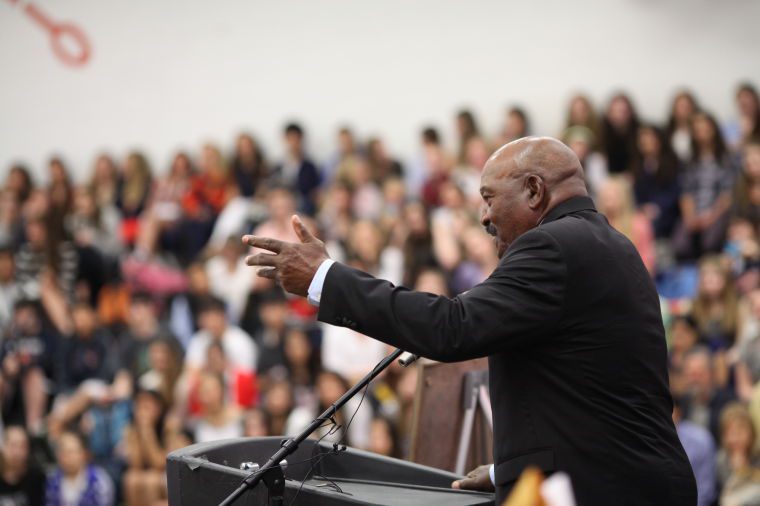
Jim Brown, who began a career on the fields of Manhasset that would lead him to acclaim as one of the greatest football players and then go on to become a movie actor and civil rights activist, died Thursday in his Los Angeles home. He was 87.
His wife, Monique, announced Brown’s passing in an Instagram post on Friday afternoon.
“To the world, he was an activist, actor, and football star,” Monique said. “To our family, he was a loving and wonderful husband, father, and grandfather.”
Brown’s former NFL team, the Cleveland Browns, paid tribute to the former star on social media.
“It’s impossible to describe the profound love and gratitude we feel for having the opportunity to be a small piece of Jim’s incredible life and legacy,” the team said in a statement on Twitter. “We mourn his passing, but celebrate the indelible light he brought to the world.”
Brown moved to Great Neck with his teenage mother before moving to Manhasset where he played five sports during the early 1950s, earning 13 varsity letters.
In 2013, Brown was honored in Manhasset as an Allstate “Hometown Hall of Famer” and as the namesake of the newly-reopened multi-purpose field at Manhasset Valley Park.
The son of a domestic, Brown grew up on the Great Neck side of Lee Road before moving to Manhasset, and his mother had to “use a little bit of trickery” to make sure her son could attend school in Manhasset, he said.
“Manhasset was a very rich community, a very affluent community, and at no time did we worry about racism and prejudice,” Brown said a decade ago when he was honored. “This was an example of how people should be treated.”
He was supported by the mostly white Manhasset community.
When Syracuse University declined to offer him a scholarship, Manhasset attorney Ken Molloy organized fundraisers in the local community to pay for Brown’s first year of college.
Brown became an all-American at Syracuse in football and lacrosse and also competed in basketball and baseball, and ran track.
In his final regular season game against Colgate, he scored six touchdowns, kicked seven extra points and rushed for 197 yards.
Brown was then drafted sixth by the Cleveland Browns.
For nine seasons from 1957-65 with the Cleveland Browns Brown did not miss a single game because of injury, retiring on his own terms after winning the NFL’s MVP award for the third time in his career.
He was named to nine Pro Bowls and led the league in rushing each year except 1962, in which he finished 478 yards behind Green Bay’s Jim Taylor.
“All you can do is grab, hold, hang on and wait for help,” Sam Huff, the Hall of Fame middle linebacker for the Giants and the Washington team now known as the Commanders, once told Time magazine.
To celebrate the league’s 100th season, the NFL announced its “All-Time Team”, a roster of 100 players and 10 coaches named the greatest in their respective positions. Brown earned the highest honor among running backs.
Coming off an MVP season in 1965, Brown stunned the football by announcing his retirement to pursue an acting career.
He would go on to appear in more than 30 movies including “The Dirty Dozen,” Any Given Sunday,” and “He Got Game.”
When the modern civil rights movement gained momentum in the 1950s, few elite athletes spoke out on racial issues. Brown was an exception.
Working to promote economic development in Cleveland’s Black neighborhoods while playing for the Browns, he founded the Negro Industrial and Economic Union (later known as the Black Economic Union) as a vehicle to create jobs. It facilitated loans to Black businessmen in poor areas..
In June 1967, Brown invited other leading black athletes, most notably Bill Russell and Lew Alcindor (the future Kareem Abdul-Jabbar), to the office of his Economic Union to hear Muhammad Ali after Ali had been stripped of his heavyweight boxing title and faced imprisonment for refusing to be drafted in protest over the Vietnam War.
The meeting is viewed as a watershed for the development of racial awareness among athletes, Brown and the others at the session publicly voiced their support for Ali.
In 1988, he founded Amer-I-Can, an organization that offers personal development for young African-Americans. Brown also participated in the Civil Rights movement in the 1960s and helped create a business preparedness organization called the Negro Industrial Economic Union, according to www.cleveland.com.
Brown’s legacy would be tarnished more than a half-dozen arrests, in most cases when women accused him of violent behavior.
“I can definitely get angry, and I have taken that anger out inappropriately in the past,” Brown told Sports Illustrated in an interview at the jail. “But I have done so with both men and women.”
But in death, Brown’s achievements far outweighed his failings in an outpouring of love and respect online.
“We lost a hero today. Rest in Paradise to the legend Jim Brown,” said basketball great LeBron James, who grew up south of Cleveland in Akron. “I hope every Black athlete takes the time to educate themselves about this incredible man and what he did to change all of our lives. We all stand on your shoulders Jim Brown.”






